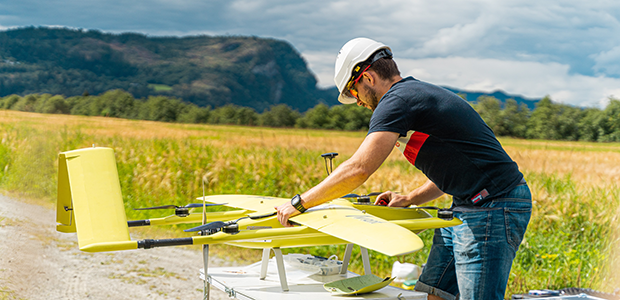
Norwegian drone logistics company, Kyte, and receives €1m in public funding
Additionally, the company has landed an additional €1 million of public funding from Innovation Norway to autonomously deliver vital prescription medicines directly from pharmacies to people in remote and suburban areas, where mobility can be challenging due to long distances and factors like bad roads or severe weather.
Founded by Lars Erik Fagernæs, Herman Øie Kolden, and Bernhard Paus Græsdal at the Massachusetts Institute of Technology (MIT) in 2020, Aviant has delivered 12 commercial contracts in Norway and Sweden, most notably transporting Covid-19 tests and blood samples between district hospitals and central hospitals during the pandemic. Since then, the company has operated over 2,500 autonomous flights, covering more than 35,000 km.
Unlike other solutions on the market, such as Google Wing or Manna Drone Delivery, Aviant’s drones are capable of flying as far as 120km in a straight line, similar to an airplane. The increased efficiency and speed means Kyte’s delivery range is significantly higher than other airborne door delivery services, being able to deliver within a 30 km radius for return flights, compared to the 2-3km offered by other providers. Aviant is certified under EU regulations to operate autonomous flights within the union.
“Our technology proved critical for rural healthcare services during the pandemic, where winter road closures meant our drones were the only link between Covid-19 test sites and laboratories in Central Norway. Now, with the launch of Kyte and our funding from Innovation Norway, Luminar Ventures, and Bring Ventures, we are able to provide people in remote and hard-to-reach areas with the groceries and medical supplies they need, directly to their doorstep, with no traffic restrictions and minimal climate emissions,” says Lars Erik Fagernæs, founder and CEO at Aviant.
Customers can request delivery through the Kyte app, where they can choose from various groceries, ready meals, and light medicines. Once the order is placed, the drones are loaded with the ordered items at Kyte’s home base before they autonomously deliver the package and return to base. So far, Kyte has made deliveries covering a distance of more than 4,000 km, with an average delivery time of 24 minutes.
According to Fortune Business Insights, the drone delivery market is set to grow from $998 million in 2020 to $31 billion in 2028, with an annual growth rate of 24,4%. More than 2,000 drone deliveries are made in the world each day, ranging from emergency supplies in remote areas to urban food delivery.
Fagernæs continues: “Door-to-door drone delivery has been a hot topic for years already, but most commercial attempts have been limited to small, open areas such as a single park or technology that limits the radius to 2-3 kilometers. Where plenty of companies have received initial funding, getting a commercial last-mile delivery service up and running has proven extremely difficult. That changes with Kyte. We have a large delivery radius, the permits to operate, and no requirements for pilots or spotters along the route. We are actually delivering food, groceries, and medicine by drone to people’s doorsteps in Norway right now.”
Aviant raised a seed round of €2.3 million in September 2022, in a round led by Bring Ventures, the venture arm of the Norwegian postal service. The company is planning to open a second base in Norway during 2023, which will enable it to serve 20,000 - 30,000 remote holiday homes with door-to-door deliveries. In the longer term, Aviant is planning to bring drone home delivery to most of the Norwegian population, as well as EU markets.
“Aviant has the perfect combination of proven, reliable technology, great people, and a market ready for the taking,” says Anett Berger Sørli, Investment Manager at Bring Ventures. “We invested in Lars Erik and the team because we see drone delivery as central to the future of logistics, and being able to launch Kyte within such a short timeframe shows how driven this team is to lead us to that future.”

